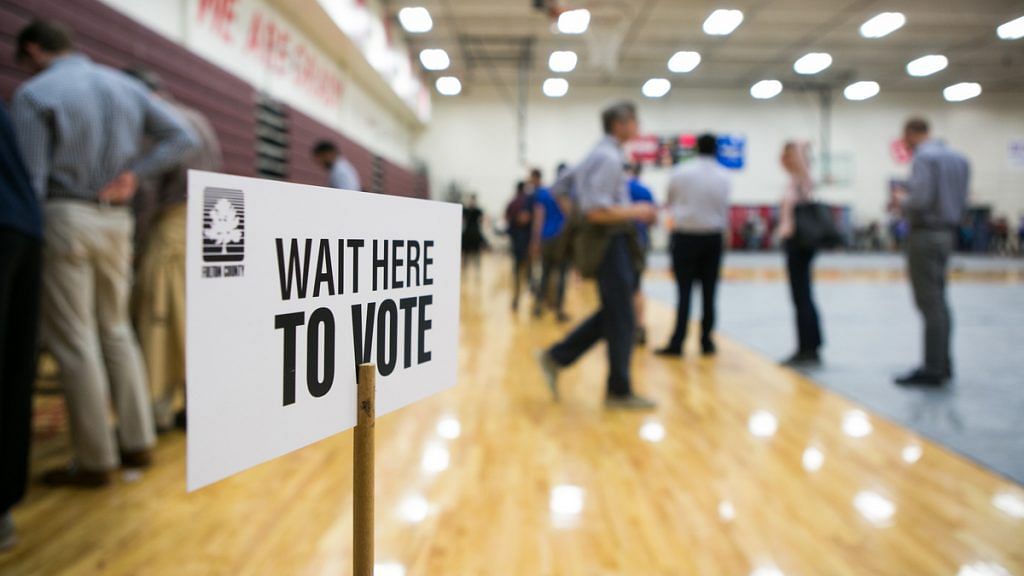A look at how poorly the US conducts its elections will make you proud of Indian democracy.
With every passing election, the Election Commission of India makes it easier for people to vote. The ECI works with missionary zeal to reach out to every Indian. Over the decades, the ECI has increased polling booths to reduce queues, included photos in electoral rolls for easier identification, and is even willing to send a car for the elderly and the differently abled to come and vote.
The election process in the United States is the opposite. To begin with, they don’t have an election commission. The election is organised by the ruling government. One shudders to think what Indian democracy would be like if the ruling government were to organise elections!
Ruling governments in US’ states do their best to make it difficult for people to vote – especially those people who are unlikely to re-elect the incumbent. Such an imperfect election process makes you wonder how the United States can call itself the “world’s greatest democracy”.
Also read: Election Commission awarded for working towards disability-friendly polls
In many countries including India, the election process is far fairer than in the US. Before the US goes around exporting democracy to the rest of the world, it needs to repair its own electoral system.
The 50 states that make up the USA all have different election laws and voting processes, so it is difficult to make any big generalisation. But the general picture is one of a system that’s broken in different ways.
Gerrymandering: Delimitation of constituencies – re-making boundaries to reflect increase or decrease in population – is not free of controversy in India. But at least an independent Delimitation Commission is set-up. In the United States, the process is blatantly partisan – whoever is in power changes the constituency borders to make sure they keep winning. This is called Gerrymandering. This is why the election in so many states is a foregone conclusion, making the election pointless. This is why India has a lot more swing states than the US.
Recounts: It’s been six days since the mid-term polls were held but the final results are still not in for the governors of Florida and Georgia, and for the Senate seats in Florida and Arizona.
Also read: Not just BJP, every political party loves a subservient Election Commission
You are not on the list: The situation is particularly dire in Georgia where Trump acolyte Brian Kemp has been accused of “textbook voter suppression” to prevent Stacy Abrams from becoming America’s first Black governor. The methods? Simply purging electoral rolls of inconvenient voters and enacting a new law that would debar you from voting if your ID card didn’t match your name on the electoral list by even one letter. Similarly, in North Dakota, the incumbent Republicans changed voting laws to make sure thousands of Native Americans can’t vote.
By contrast, the Election Commission of India finalise results very fast, and goes out of its way to prevent frauds such as unfair removal of names from electoral rolls. These days, EC officials go from house to house checking if anyone’s been unfairly removed from the rolls.
Felony disenfranchisement: In many US states, like in India, those in jail for serious crimes (felonies) cannot vote. In three US states, they can’t vote even when they have served out their sentences! This is the legacy of a long history of finding ways to prevent Black people from voting. Since the criminal justice system puts a disproportionately large number of Black people in prison, that becomes a means to disenfranchise them.
In Florida this mid-term election, voters voted to let ex-felons vote, but not if they had committed murder or sex crimes. Great way of reforming criminals and rehabilitating them into society. Nevertheless, this move in Florida could add up to 1.4 million new voters, enough to change the Presidential election result in 2020. The states of Iowa and Kentucky await similar reform.
No holiday: Anywhere in the world, people are reluctant to stand in queues, cast their votes, wondering if one vote will make a difference. It is thus important to make voting easy. One basic thing to do is to have a public holiday, so people don’t have to struggle between the choice of earning a wage or electing the government. In many places including India, the effort is to organise elections on Sundays, so there’s no loss.
The United States doesn’t have a public holiday on election days, making it difficult for the working class to vote. Taking time off to go and vote can be a luxury only the rich can afford in a country that measures wages by the hour.
Also read: After US midterm elections, India needs to build bridges with more Congress members
Broken machines: Yes, electronic voting machines malfunction in India too. But in the US, the malfunctioning seems to be focused on booths with predominantly black voters. Some states have voting machines, some have ballots. In some places, there weren’t enough ballots or machines, making for long queues, thus discouraging many from voting.
There’s a raging debate in India about the EVMs and whether they are rigged in favour of the BJP. So far, there is no evidence to prove this claim. But the polling booth malfunctions in the US will make you feel better about the election process in India, which is at least organised by an autonomous and neutral body.
Despite all these issues, the US saw the highest turnout in a mid-term election in 50 years. How much? Only 47 per cent. Not the final figure because they’re still counting, of course.
